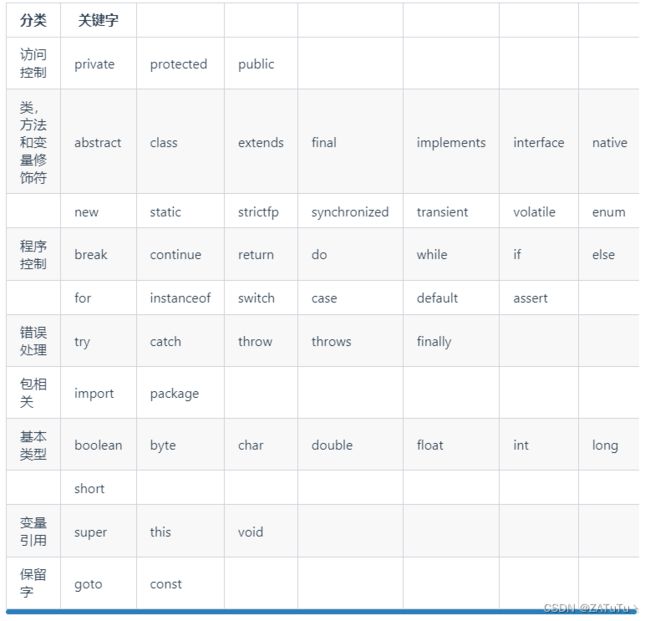JAVA中关键字
主要是java开发面试或笔试中常见或者常考的关键字特性介绍
文章目录
- 类方法和变量修饰符
-
- final关键字
- abstract关键字
- static 关键字
-
- 关于static执行顺序
- implements 和 interface 关键字
类方法和变量修饰符
final关键字
用于声明不可变性,它可以应用于变量、方法和类。以下是 final 关键字在不同上下文中的用法。
final变量:
final 变量是常量,一旦赋值后,其值不可更改。
final 实例变量必须在对象的构造函数中进行初始化,或者在声明时直接初始化。
final 本地变量(在方法或代码块中声明的变量)必须在声明时初始化,不能再次赋值。
final int x = 10; // 声明并初始化一个final变量
final double PI = 3.14159;
public void exampleMethod() {
final int y; // 声明一个final本地变量
y = 20; // 初始化final本地变量
}
final方法:
final 方法是不可覆盖(override)的方法。子类不能重写父类中的 final 方法。
常用于确保方法的逻辑在子类中不被修改。
public class Parent {
public final void finalMethod() {
// 这个方法在子类中不能被重写
}
}
final类:
final 类是不可继承的类,即不能有子类。
通常用于防止类被继承和修改,或者表示一个类已经完全实现,不能再被扩展。
public final class FinalClass {
// 此类不能被继承
}
final 的主要作用是为了确保不可变性、安全性和稳定性。在多线程环境中,final 变量可以用来实现线程安全,因为它们保证了在构造过程中的可见性,并且一旦初始化后,其值不会发生改变。final 方法和类则用于确保不变的行为和避免子类对其进行不当修改。
abstract关键字
java中,抽象类(Abstract class)是一种特殊的类,它不能被实例化,一般作为其他类的基类(父类),它定义了一些方法的声明,但不提供方法的实现,留给它的子类来完成实现。
- 声明抽象类
public abstract class AbstractClass{
// 抽象方法,没有方法体
public abstract void abstractMethod();
// 普通方法,有方法体
public void regularMethod()
{
System.out.print("这是一个普通方法");
}
}
- 继承抽象方法
子类继承抽象类,并实现其中的抽象方法。
public class ConcreteClass extends AbstractClass{
// 实现抽象方法
public void abstractMethod()
{
System.out.print("这是抽象方法的实现");
}
}
- 实例化子类
AbstractClass obj = new ConcreteClass()
obj.abstractMethod(); // 调用子类的实现
注意!
- 一个类包含抽象方法,他必须被声明为抽象类
- 子类必须实现所有父类的抽象方法
static 关键字
static 用于定义静态成员(静态变量和静态方法)以及静态代码块。
static 关键字的主要作用是使成员与类相关,而不是与类实例相关。
- 静态变量
静态变量也被称为类变量,它属于类而不是类的实例,在类加载时分配内存,并且只有一份副本,所有实例对象共享相同的静态变量。
public class Myclass{
public static int staticVartiable = 10;
// 类的其他实现
}
- 静态方法
静态方法属于类而不是实例对象,可以通过类名直接调用,而不需要创建类的实例。
public class Myclass{
public static void staticMethod()
{
System.out.println("这是静态方法");
}
// 类的其他实现
}
- 静态代码块
静态代码块是在类加载时就执行的代码块,用于初始化静态变量或者执行一些静态操作。在类中他只执行一次。
public class Myclass{
static {
Sytem.out.print("static block");
}
}
关于static执行顺序
无继承关系:
public class Example {
static {
// 静态代码块
System.out.println("Static block");
}
{
// 代码块
System.out.println("Non-static block");
}
public Example() {
// 构造函数
System.out.println("Constructor");
}
public static void main(String[] args) {
new Example();
new Example();
}
}
输出结果如下:
-------------------------------------
Static block
Non-static block
Constructor
-------------------------------------
Non-static block
Constructor
有继承关系
// 父类
public class FatherExample {
{
System.out.println("Father Non-static block");
}
static
{
System.out.println("Father Static block");
}
public void Example()
{
System.out.println("Father Constructor");
}
}
// 子类
public class Example extends FatherExample{
static {
System.out.println("Son Static block");
}
{
System.out.println("Son Non-static block");
}
public void Example()
{
System.out.println("Son Constructor");
}
public static void main(String[] args)
{
new Example();
new Example();
}
}
执行结果:
-------------------------------------
Father Static block
Son Static block
Father Non-static block
Son Non-static block
-------------------------------------
Father Non-static block
Son Non-static block
implements 和 interface 关键字
implements是java中的一个关键字,用于实现接口,接口是java中的一种抽象类型,定义了一组抽象方法,而类可以实现implements这些接口来提供具体的实现。
1.接口定义
接口通过interface关键字定义,接口中的方法默认是抽象的,没有方法体,接口中通常包含常量
interface MyInterface{
// 两个抽象方法,一般接口中不定义成抽象方法,依靠写作规范约束
void method1()
void method2()
}
- 类实现接口
类可以使用implements关键字来实现一个或多个接口。实现接口类中必须提供接口中所有声明的首相方法的具体实现。
public class MyClass implements MyInterface,MyInterface2
{
@Override //重写的意思
public void method1(){
// 具体实现
}
@Override //重写的意思
public void method2(){
// 具体实现
}
}
